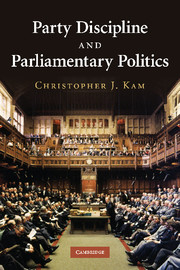Book contents
- Frontmatter
- Contents
- List of figures
- List of tables
- Acknowledgements
- 1 Introduction
- 2 A model of intra-party politics
- 3 Patterns of backbench dissent in four Westminster parliamentary systems, 1945–2005
- 4 Policy preferences and backbench dissent in Great Britain and Canada
- 5 Dissent, constituency service, and the personal vote in Great Britain and New Zealand
- 6 The cost of dissent to the party
- 7 Demotion and dissent in the Canadian Liberal Party, 1991–1997
- 8 Discipline and dissent in the Australian Coalition, 1996–1998
- 9 Career trajectories, socialization, and backbench dissent in the British House of Commons
- 10 Conclusion
- Appendix 1 Comparative statics and proofs
- Appendix 2 Content and construction of ideological scales
- Appendix 3 Sampling and coding of media dissent and discipline
- Appendix 4 Demotion and the parliamentary careers of Canadian MPs
- References
- Index
2 - A model of intra-party politics
Published online by Cambridge University Press: 03 July 2009
- Frontmatter
- Contents
- List of figures
- List of tables
- Acknowledgements
- 1 Introduction
- 2 A model of intra-party politics
- 3 Patterns of backbench dissent in four Westminster parliamentary systems, 1945–2005
- 4 Policy preferences and backbench dissent in Great Britain and Canada
- 5 Dissent, constituency service, and the personal vote in Great Britain and New Zealand
- 6 The cost of dissent to the party
- 7 Demotion and dissent in the Canadian Liberal Party, 1991–1997
- 8 Discipline and dissent in the Australian Coalition, 1996–1998
- 9 Career trajectories, socialization, and backbench dissent in the British House of Commons
- 10 Conclusion
- Appendix 1 Comparative statics and proofs
- Appendix 2 Content and construction of ideological scales
- Appendix 3 Sampling and coding of media dissent and discipline
- Appendix 4 Demotion and the parliamentary careers of Canadian MPs
- References
- Index
Summary
Introduction
MPs might benefit collectively from maintaining a united front, but individually they face incentives to act independently. Party leaders use a variety of strategies to counteract these incentives: screening out the uncongenial, distributing office perks to the loyal, and disciplining the recalcitrant. Judging by the high level of cohesion exhibited by parliamentary parties, leaders apply these methods skilfully. Unity is not preordained, however: MPs can and do dissent from the party line. In this chapter I explore the strategic interaction between MPs and party leaders, asking what motivates MPs to toe the line or dissent and in light of these motives, how party leaders forge unity. My argument, broadly speaking, is that leaders elicit loyalty in the short and medium term by judiciously distributing career advancement to MPs. In the long term, however, these direct appeals to MPs' career ambitions lose their force and leaders have to rely on discipline and social pressure to limit dissent.
MPs' preferences: policy, office, and votes
The consensus in the legislative behaviour literature is that politicians desire a combination of policy influence, office perks, and votes (i.e., re-election) (Müller and Strøm 1999). The drive for re-election is certainly a powerful one. As Michael Laws, a New Zealand National MP, noted in his memoirs, ‘Having been elected an MP, I wished to be re-elected. All my actions over the next three years would accumulate merit or demerit points toward that objective’ (Laws 1998, p. 185).
- Type
- Chapter
- Information
- Party Discipline and Parliamentary Politics , pp. 21 - 37Publisher: Cambridge University PressPrint publication year: 2009



